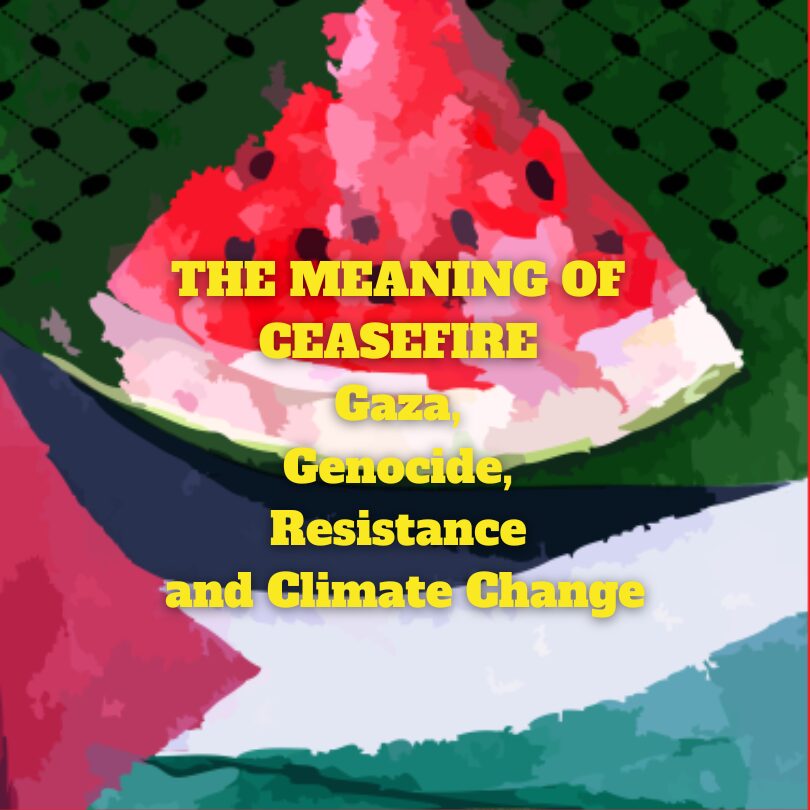
THE MEANING OF CEASEFIRE: Gaza, Genocide, Resistance and Climate Change
BY NANCY LINDISFARNE and JONATHAN NEALE
Sooner or later, there will be a ceasefire in Gaza. When it comes, it will be a defeat for Israel. After all, the main goal of Gazans, Palestinians and the global solidarity movement has been a ceasefire. And the ceasefire will come about because of solidarity, resistance and a global mass movement from below.
Since the attack of Oct. 7, the Israeli government has said their aim has been to exterminate Hamas. But it has been clear from the outset that the only strategy they could imagine has been to kill a very large number of Gazans. In their effort to re-establish control they have chosen to kill enough people to leave all Palestinians terrified for a generation. They say their aim has been to eliminate Hamas fighters and supporters, but in fact their targets have been the children, women and men of Gaza. The 25,000 people who have died are not collateral damage. They are the damage.
This is why a ceasefire will be a defeat for Israel.
The Military Situation
The first line of resistance to the Israeli onslaught are the Hamas fighters. Israel is not winning this war. They began bombing Gaza more than 100 days ago, and they invaded with ground troops and tanks almost three months ago.
At the end of January, the Financial Times said that Israel controlled a strip across the center of Gaza. They no longer control the North. There is fierce fighting in the South, where the Israeli military says it will take many months to “win”. Even then the Israeli military will face a long guerilla war.
Every anti-colonial war in the last eighty years has been mainly a guerrilla war. If Israel cannot stop guerilla attacks, they will not have won.
It is unclear how many Israeli soldiers have been withdrawn from Gaza, but it is a substantial number. They have been withdrawn because they may be needed for a war with Lebanon, but also because mobilizing so many reservists has hurt the Israeli economy.
But military victory has clearly not been the war aim of the Israeli government. To repeat, their aim has been to kill as many Gazans as possible to terrify all the whole population. Genocide is not a mistake; it is the strategy. Because they cannot win on the ground, they rely on bombing, hunger and disease.
Solidarity
Hamas is important, but the solidarity from Gazans as a whole matters more. This is a people in resistance.
Many doctors, nurses and other health workers have refused to leave their posts, knowing that it would probably mean their deaths. The Israeli forces have killed over a hundred journalists. Many of the journalists have been killed in targeted air strikes that also killed their whole families at once. In the face of such threats to everyone they love, the journalists and their families have stood their ground. This level of courage is almost unimaginable, but common in Gaza. And people in Gaza have not turned against Hamas.
The courage of Gaza and the cruelty of the Israeli government have inspired enormous demonstrations in Indonesia, Yemen, South Arica, Jordan, Turkey, Egypt, the United States, Ireland, Bangladesh, Britain and many other parts of the world.
Everywhere these are the largest demonstrations for Palestine ever. Almost everywhere, this movement from below is in stark contrast to the cowardice and collaboration of governments.
When the ceasefire comes, it will be because of the courage of Gazans and the solidarity movements of the ordinary people of the world. And these will have forced governments to make the Israeli armed forces stop.
After the Ceasefire
After the ceasefire, Israel will emerge from a far weaker power than it was in September 2023. They will be morally wounded. That shift in the balance of power has already begun. Last year a majority of people in the world believed that Israel was a racist state. Now a majority of human beings believe it is a genocidal state. Given the historical justification for Israel, the judgement against Israel at the International Court of Justice is a devastating truth and a major blow for the state.
The key thing is the direction of change, in America and the world. When the genocide began, there was an outpouring of feeling on the streets around the world which showed that attitudes toward Palestine had already changed in the last decade. Since then the scale of cruelty has changed people more.
The shift in public opinion is global. It is true even in Britain and the United States. In Britain one poll in late December found that 48% of people definitely supported a ceasefire, and 23% said they probably supported one. Only 12% definitely or probably opposed a ceasefire. In the United States in December and January polls reported around 60% support for a ceasefire.
The cruelty of the Israeli state is becoming the majority opinion across almost every country, and the direction of change will continue after the ceasefire. This has happened in the wake of earlier antiwar movements in the US and other countries. Good wars often quickly become bad wars after the fact. That will make boycotts, economic sanctions and disinvestment easier to fight for. This process is likely to have serious consequences for the Israeli economy and may lead to large scale Jewish emigration.
Moreover, the longer the killing lasts before the ceasefire, the more widely and deeply Israel will be condemned afterwards. In the medium term, in five or ten years – maybe more, maybe less – there will be another conflict, at which time Israel will have more enemies, and more bitter enemies.
The government in Israel, and the generals in the IDF, know these things. They know that they will be weaker in the long term. That is why the Israeli government and military are so enraged and so brutal now. They feel they must kill more and more until they have killed enough to permanently terrify the Gazans. And the more they do that, the more they undermine the Israeli state in the long term.
The Governments in the Region
The Houthi government of Yemen have attacked ships in the Red Sea going to Israel. They are resisting America and Britain. But as a government they are so far unique.
Others, the governments of Saudi Arabia, Jordan, Egypt, Lebanon, Algeria, Kuwait, the UAE, Syria and Iraq have supported the people of Gaza on a verbal level. They voted for a ceasefire at the UN. They hesitated to support the South African case against genocide, but shame and popular pressure forced them to do that.
But these governments have done little of what they could do. They have avoided the actions that could make a difference. The Egyptian government has not opened the Rafah crossing to Gaza, they have not cut off the supply of gas to Israel, nor have they closed the Suez Canal.
Turkey, Egypt and the United Arab Emirates have not broken diplomatic relations and expelled the Israeli embassies. Nor have any European countries broken relations. Some Latin American countries have done so. But these actions cost them little.
Turkey, Iran and the Arab countries have not moved to blockade Israeli trade. In 1973 the oil producers in the region cut off oil and gas to the United States. No one is doing that now.
And there is a further uncomfortable truth. The people of Egypt, Jordan, Lebanon, Saudi Arabia, Algeria and the rest have not risen up to insist their governments blockade Israel. They might – everyone in the region is aware that they might. But these are countries where the Arab Spring of 2011 was brutally defeated. These are places where people live in ambient fear of the secret police and their torture dungeons. They are also places where people tried with all their hearts to change the world and were defeated.
All this means that the people hesitate, and who can blame them? But it is the reason the United States, and the Arab governments, remain terrified of popular uprisings.
The New Normal
Israel will lose in the long term. But this is no time to rejoice. There are all the dead and wounded and orphaned already. There are more to come.
And of course there could be a much wider war. We see it, right now, beginning to spread. The chapter of accidents, the fear of the oppressors and the fury of the oppressed have created terrible wars before now.
The only consolation is that most people in the world will blame the Israelis and the Americans should the war spread. And if there is a greater war, both Israel and the United States will emerge as pariahs.
And the assault on Gaza marks marks a step change in three respects. The first is in what oppressors across the world can imagine in terms of sheer wanton brutality against a population. Here what is happening in Gaza is unusual, but not unique. But this cruelty is marking a new normal. We can see this in what the Pakistani government is doing in Balochistan now, and what the Russian backed RSF in Sudan is doing now.
Second, what is new is that the oppressed have been able to film the genocide on their phones, and the whole world has been able to watch on our phones, and the censorship of the media has not stopped that. This has made the lies and the arrogance of the Israeli government, and the American, British and Canadian governments, seem far more brazen.
Third, we can also see our future as climate change accelerates. We are headed for a world of wars, cruelty, massacres, genocide, ethnic cleansings and persecutions of ever rising numbers of refugees.
The people in Gaza have been refugees for generations. What is being done to those refugees now has been made possible because there is already a global rising tide of racism and persecution towards refugees – especially in the majority white countries, but not only there. The killing in Gaza, in turn, will make possible further and deeper suffering for refugees in many other places.
The United States
The changing balance of feeling in the world will weigh heavily on the calculations of the rich and powerful in the United States.
The United States has backed Israel for a long time. And for decades this made ugly strategic sense. During the wars of 1967 and 1973 Israel had humiliated the Arab nationalists and Arab nationalist states, the main challengers to American control in the region, while Iran finished with the United States with the fall of the Shah in 1979. But that was a long time ago. By the first Gulf War in 1990, America was building support among Egypt, Syria, Lebanon and the oil producers of the Gulf. By then, Israel was already a handicap to American power in the region.
There is no absolute and necessary connection between the United States and Israel now. When the cost to the strategic interests of American corporations grows too much, and American opinion turns against Israel, the US will at some point withdraw support.
That point is not upon us yet. In the wake of the genocide decision of the International Court of Justice, the US and its allies – Canada, Australia, Britain and the European Union – have withdrawn support from UNWRA, the UN agency that supplies food, shelter, health services, education and social services to Palestinian refugees.
The effect, and the intended effect, will be to accelerate mass hunger and disease in Gaza. America and its allies have committed themselves openly to enabling genocide. This is an extraordinary thing to do at this moment. Why?
The reason is to be found in a global crisis of American power. This crisis has been a long time coming. It’s roots are in America’s relative economic decline and the rise of China as the world’s leading industrial power. In addition, the US military lost the war in Iraq, and almost all their troops were forced to leave. Then a guerilla uprising across Afghanistan forced the Americans out in a humiliating and public defeat. For a while it looked like the Pentagon had restored the American brand by military support for Ukraine, but that victory now looks shakier.
And in the long run the United States cannot continue to dominate the Middle East. The majority of Americans already want a ceasefire. What is not often understood is that after the long wars in Afghanistan, Iraq and Syria, a very large majority of Americans want no more soldiers sent to war. They may be willing to tolerate overseas bases and terrible bombing raids, but they will not stand for more dead Americans. This feeling is stronger among Republicans than among Democrats, because the soldiers come more from working class families and Southern families. The soldiers, and their families, are proud of their service, but they want no more of those wars.
That is why the American military lost in Afghanistan and will lose in Yemen. You cannot conquer a people by bombing them. You can only do it by an invasion with many soldiers on the ground. And often, as we are seeing in Gaza, even troops on the ground cannot generate a win.
Moreover, the United States has now lost control of the United Nations. Decades ago the US lost control of the General Assembly, but they have retained effective control of the Secretary General and the administrative apparatus. Until now.
Over Gaza, all the senior UN executives and agencies have come out strongly for a ceasefire. They have done so because they are genuinely outraged. But they have also been able to do so because they have understood that American power in the world is waning.
The moment of the ceasefire will be the moment when American weakness becomes glaringly evident. That is why the US government has doubled down on genocide now. But the moral obscenity of this position will make their global standing weaker.
It should be added, the defeat of American global power is not a bad thing for American people. The majority of Americans now believe, rightly, that both foreign wars and the structure of global trade are bad for their lives. This is part of the appeal of Donald Trump. He says these things, while Biden and the mainstream Democrats hang on to the habits of empire like grim death.
Joe Biden has been badly damaged by the genocide in Gaza. In his whimpering visit to Israel, he appeared politically weak and unable to stand up to Netanyahu. He has also appeared physically weak and old, staggering as he walked, emotionally rigid and cognitively slow. Many Americans do not want such a weak president for another five years, and many now find him morally repugnant. The result is that Biden was leading Trump in the polls before Gaza and is now behind. This process is likely to continue. The election is still almost a year away, but if the war widens, or the global economic damage increases, Biden will be finished.
One sign of Biden’s moral decrepitude is that clearly, for him, his running for a second term as president is more important than stopping Trump. Another sign is that it also more important to him to support genocide than to stop Trump.
Putin, Trump and the Racist Right
As American power wanes, the power of the Russian and Chinese states is increasing.
Many people have seen that as the power of the West and the white-dominated states falls, there has been a rise in the power of the Global South. There is truth in this insight, but it also hides some confusions.
First, Israel and America are waging a race war in Gaza. This is why the word genocide is appropriate. They are also waging a war against Muslims. (Of course some Palestinians are Christians, but most are Muslim.) Paying attention to racism is important. This is the reason why anti-racists all over the world are marching against the genocide. And that includes Muslim, immigrant and white anti-racists in Europe and North America. It marks an important shift in a global structure of feeling. We saw it growing in the resonance of Black Lives Matter had around the world, and in the fact that half of those BLM protesters in the US were white.
Second, the decline in American power also means a rise in Russian power. Here things get complicated. For at least a decade Putin has been the leading figure in a new global far right that is racist, anti-Muslim, anti-LGBT and anti-feminist. The other key figures in this alliance were Trump in America, Modi in India, Bolsonaro in Brazil, Duterte in Philippines, Netanyahu in Israel and Orban in Hungary. But there are now mass movements of the new far-right in many other countries around the world. The rise of Russian power internationally will also be a victory for that racist right.
This will have consequences in many places. In Ukraine, for instance, both sides are stalled militarily. The American alliance has bought money and arms to Ukraine. But in the wake of Gaza, American support leaves Ukraine at least partly discredited. Moreover, Putin’s most important strategy has been to wait for the re-election of Donald Trump. Mainstream American commentators often see the alliance between Trump and Putin. But they interpret this alliance as a personal failing, or as treason. It is neither. Putin and Trump are on the same side in a global battle between racists and anti-racists.
Putin’s strategy seems to be working better than expected. Trump’s influence has turned most of the Republican Party against support for Ukraine, and it looks increasingly likely that American government support will be cut off.
Many on the left in North America and Europe are in denial about this alliance. They can see that to be with Gaza means to be against Biden. They can’t see that to be with Putin means to be with Trump, and vice versa. In this situation, as in so many others, thank God for the clarity of Greta Thunberg. She makes it seem simple, because the solution to the contradiction is simple: Greta is with Gaza AND with Ukraine.
There are similar consequences for rising Russian power elsewhere. For example, in Sudan the paramilitary RFS are committing massacres, often racist massacres, all over the country. Crucial to their power is the gold and support of the Wagner group, a privatized arm of the Russian state. And in Syria, Russia props up the murderous cruelty of the Assad regime.
Third, although the rising power of China and the role of China are very important, we simply don’t have the time and space to write about them here. We hope to return to these cases in later articles. But the implications and the contradictions will be similar to those with growing Russian power.
Oil Wars
Gaza is also a war for oil, and a war for control of the Middle East. For generations now, an alliance between the United States, Europe, the regimes in the Arab oil states – and until 1980 Iran – has controlled the largest reserves of oil in the world. This is an alliance against other potential imperial powers. But more crucially it is also a class war, an alliance of the regimes against the people of the region.
That is why the Iranian government crushed the Green Revolution of 2009-2010, and why the governments of the United States, China and Russia worked together to crush the Arab Spring of revolts for democracy in 2011. It is why they fear new uprisings. The dictatorships have sided with the Palestinians verbally because they fear their own people. But that is the same reason why they do so little in practice. They fear that protest and solidarity from below in solidarity with Palestine will sweep away their regimes as well.
The Climate Movement
Finally, what does all this mean for the climate movement? First, it means a new understanding of social movements. Particularly in Europe, the dominant set of ideas in the movement has been that we must remain nonviolent at all costs. And much of the movement has believed that we must not take power. Rather, we can only protest and persuade the powers that be to change their minds.
Now we see a different future. Climate change will produce bitter wars, bitter social struggles, revolutions and mass fascist movements. This will be a world of great cruelty, of droughts and famines. With Gaza, it is easy to know which side you are on. In many, many future wars it will not be so obvious.
Gaza also teaches us the importance of power, not just resistance. And we cannot decarbonize the world without taking power. Again, that will involve compromises that are hard to evaluate, and the mass movements will be betrayed many times.
Until now the climate movement in Europe has been riddled with prejudice against Muslims. Now we are in solidarity with Muslims, and with people with Islamist politics. This time almost no one has been deceived by the trick argument that was used in Afghanistan – that feminists must support killing Muslim women and children in order to liberate Muslim women.
Margaret Mead’s idea that we only need a dedicated minority of 3.5% of the population to change the world has been often cited in the climate movement, particularly in Extinction Rebellion. This has been exposed as nonsense. Revolutions and great movements for reform cannot win without the support of a large majority of the population, and without millions prepared to die if they have to. To change the world we will need a movement on the scale we have seen in Gaza.
This does not mean we should move rightward to placate the majority. But it does mean we must win majorities. And we cannot stop climate change unless we stop it globally. That means, as with Gaza, that the center of the movement must be in the Global South, where 80% of human beings live. But equally, we will not stop climate change without mass movements in the North.
That’s a tall order. But the courage of Gazans has shown us three important things. The first is that global politics is not centrally a matter of competition between states and super-powers. Class politics, and the clash between the oppressed and their oppressors, matters more. Gaza has been a rising from below.
The second is that international solidarity from below is crucial. The third is that resistance can win.
In the fight to rescue ourselves, humanity, from climate change, the vista before us is terrible. The road will be full of suffering. But we have seen a light on the path.





